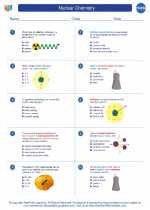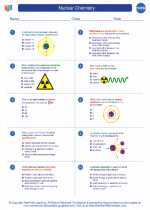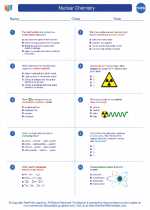Gas
In chemistry, the term "gas" refers to a state of matter in which the substance has no fixed shape or volume. Instead, gases expand to fill the entire space available to them, and they can be compressed or expanded easily. Gases are made up of particles that are far apart and move freely in all directions. Understanding the behavior and properties of gases is an important aspect of chemistry, as it has many practical applications in fields such as engineering, environmental science, and medicine.
Key Concepts
- Gas Laws: The behavior of gases is governed by several gas laws, including Boyle's Law, Charles's Law, and the Ideal Gas Law. These laws describe the relationships between the pressure, volume, temperature, and quantity of a gas.
- Properties of Gases: Gases have specific properties, including expansion, compressibility, diffusion, and effusion. These properties help to differentiate gases from other states of matter.
- Kinetic Molecular Theory: This theory explains the behavior of gases based on the motion of their particles. According to the theory, gas particles are in constant, random motion and have negligible volume compared to the volume of the container.
- Gas Stoichiometry: Gas stoichiometry involves the calculation of the amounts of reactants and products in chemical reactions involving gases. This includes using the ideal gas law to relate the amount of gas to its pressure, volume, and temperature.
Study Guide
To effectively study the topic of gas in chemistry, consider the following steps:
- Understand Gas Laws: Familiarize yourself with Boyle's Law, Charles's Law, and the Ideal Gas Law. Practice solving problems related to each of these laws to solidify your understanding.
- Learn Gas Properties: Memorize and understand the properties of gases, including expansion, compressibility, diffusion, and effusion. Consider real-life examples of these properties in action.
- Review Kinetic Molecular Theory: Study the Kinetic Molecular Theory and how it explains the behavior of gases at the molecular level. Visualize and understand the motion of gas particles in different scenarios.
- Practice Gas Stoichiometry: Work through problems involving gas stoichiometry to become proficient in relating the amounts of gases to their pressure, volume, and temperature in chemical reactions.
By mastering these key concepts and following the study guide, you can develop a strong understanding of the topic of gas in chemistry and confidently tackle related problems and questions.
[Gas] Related Worksheets and Study Guides:
.◂Chemistry Worksheets and Study Guides High School. Nuclear Chemistry

 Worksheet/Answer key
Worksheet/Answer key
 Worksheet/Answer key
Worksheet/Answer key
